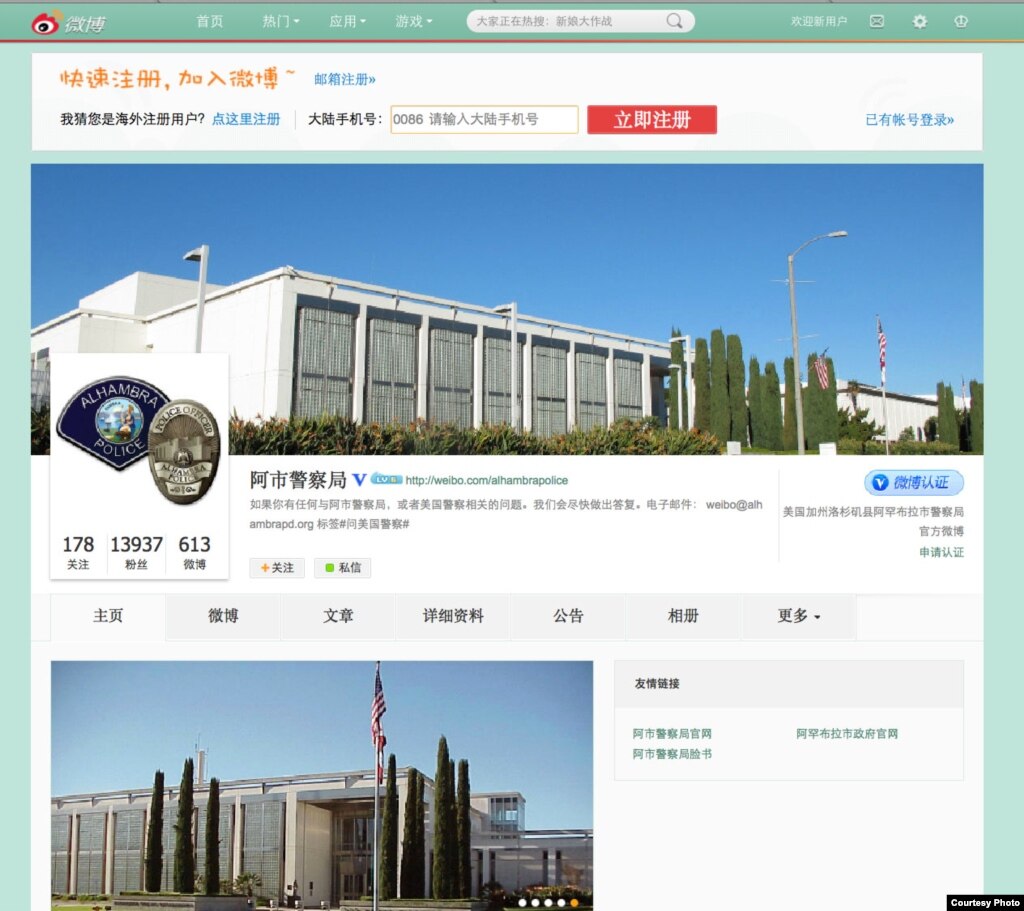
A California police department is using a non-traditional tool to reach the local population. It is the first example of American police opening an account on Weibo, the popular Chinese website.
This move is having a major effect on a city near Los Angeles.
Xu RunGang owns a restaurant in the California community of Alhambra. As the owner, Mr. Xu has a lot on his plate -- meaning he has many different duties. He makes sure his restaurant serves quality food. He also keeps records of how much money the business earns and spends.
Mr. Xu also has another important duty: keeping his employees safe. For that, he turns to the Alhambra Police Department’s page on the social media site Weibo.
Xu RunGang says the police leave messages explaining how they guard, or patrol, the neighborhood around his restaurant. He can also ask police officers safety questions. For example, he says, he and his employees work until late at night. The police offer a free service to look at the area around the restaurant. They also offer advice on security issues.
The Alhambra Police Department opened its account on Weibo last year. This surprised local residents, including Wu Shuang.
She says that, in the beginning, she thought it was really unusual. She could not imagine that an official U.S. agency would ever use Chinese-language social media.
Creating a Language Bridge Between Communities

Police Captain Clifford Mar says more than half of the city's 80,000 residents are Asian, and most are Chinese. So, he says, deciding to have an account on Weibo made perfect sense.
“So the reason for that is to really to create a bridge between the community, a communication between the Chinese-speaking community and our police department and communicate, make them aware of our, how we can help them.”
Only 10 percent of Alhambra’s police department is Asian. And with limited resources, Mr. Mar says the website is an important tool to reach the Chinese community.
“Part of the Chinese culture is a closed society. They’re not in a sense outgoing and bringing problems out to the public, or especially some other entity like a police department. So, a lot of crimes go unreported.”
The Weibo account is also a place where the Asian community can find other information. Community members can read about road conditions. They can even ask questions that help new immigrants learn about life and culture in the United States.
Wang XinYi is a volunteer for the police department’s Weibo account.
She says residents ask all kinds of questions, including advice for what to do if neighbors are arguing loudly at night.
Alhambra police say police in other U.S. cities are watching to see the results of their Weibo experiment.
I’m Anna Matteo.
This story was reported by VOA Los Angeles correspondent Elizabeth Lee. It was written in Special English by Anna Matteo.
Words in the News
unusual – adj. not normal or not common; not often done, seen or heard (“After the divorce, his behavior became so unusual that his friends barely recognized him.”)
security – n. freedom from danger or harm; protection; measures necessary to protect a person or place (“Security was increased in the city.”)
volunteer – n. (a verb or a nown) a person who chooses to do something without being asked, usually without being paid (“She volunteers every weekend reading to sick children in the hospital.” Or "She is a volunteer at the hospital where she reads to sick children.")
communication – n. the act or process of using words, sounds, signs, or behaviors to express or exchange information or to express your ideas, thoughts, feelings, et cetera, to someone else (“The key to every good relationship is communication.”)
And that's the Words in the News.
Now it’s your turn to use these words in the news. In the comment section, write a sentence using one of these words and we will provide feedback on the use of vocabulary and grammar.
